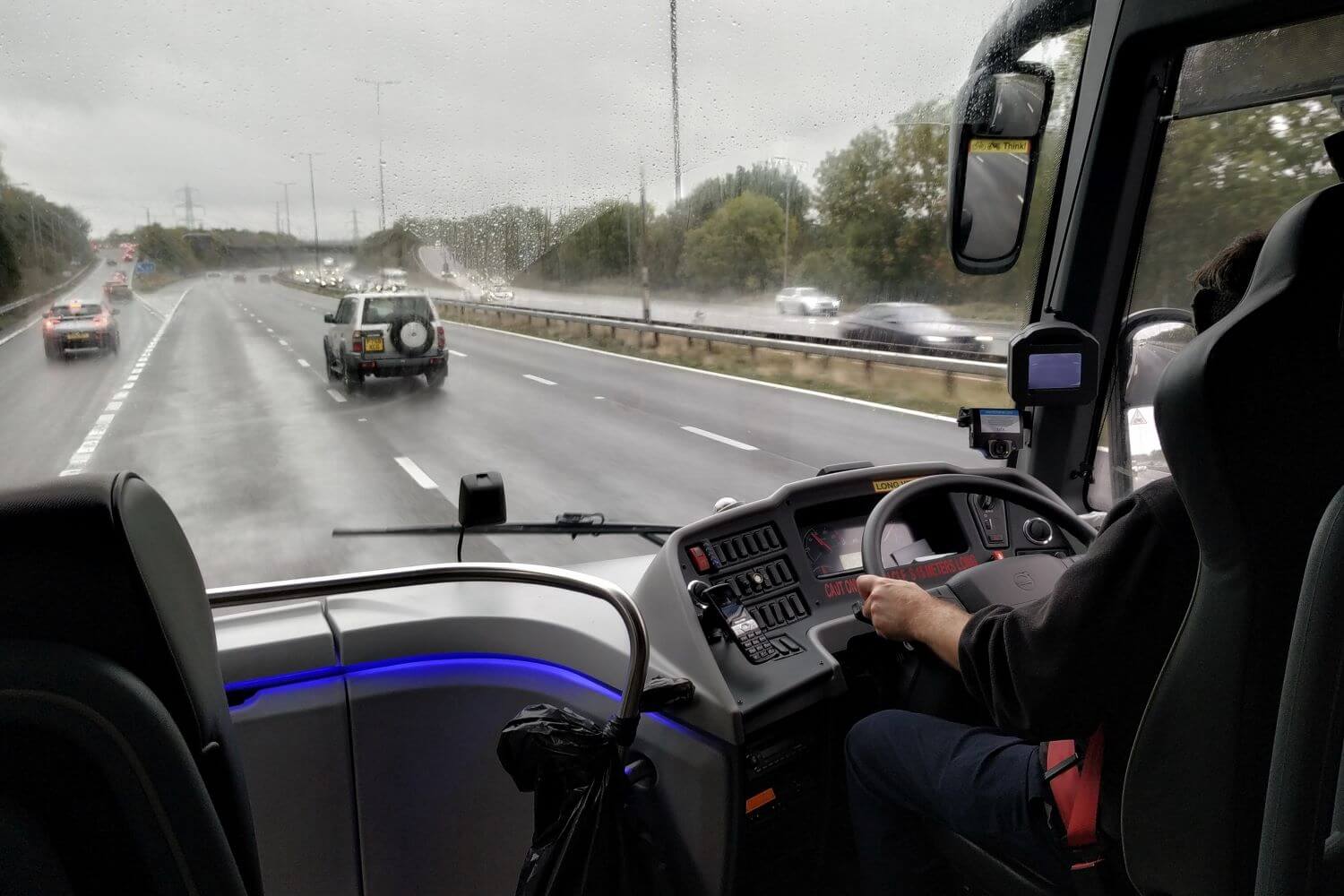Directors’ O-Licence compliance responsibilities, guidance on proposal-to-revoke letters and driver mental health were all covered at the recent CE Transport Law Annual Conference
Navigating O-Licence compliance legislation was the central theme at the CE Transport Law Annual Conference 2025, held in association with Beverley Bell Consulting and Training in Milton Keynes, on 10 April.
With the tagline “Shifting Gears: Navigating Law and Building Competence”, the conference welcomed attendees from both the PSV and HGV sectors.
In between opportunities for networking, delegates heard from the outgoing Senior Traffic Commissioner (TC) Richard Turfitt, while key topics were responding to proposal-to-revoke letters and employee mental health.
Responding to letters from the Traffic Commissioner
A letter from the TC proposing to revoke, curtail or suspend your O-Licence can be a scary correspondence to receive as a coach or bus operator. However, it is your response to a proposal-to-revoke letter which can be crucial to the future success or survival of your business. That was the message from the opening address at the conference.
Carolyn Evans, Principal Solicitor at CE Transport Law, explained some of the pitfalls to avoid, given what she has witnessed many times in her professional role, and handed out some tips to best ensure you can continue without penalty.
The most serious outcome would be revocation of O-Licence, which takes place when the operator is deemed as failing to meet any of the principal requirements of compliance: having good repute, professional competency or good financial standing.
She began by explaining the rationale behind the dramatic legal wording in the letters.
“The reason they look a bit scary is because they are designed to propel you into action,” she says, later adding that it ideally has the effect of making the operator give as thorough a response as possible from the beginning to save lengthy correspondence down the line.
The need to be comprehensive in your reply was repeatedly stressed by Carolyn. The letter needs to be treated seriously and professionally, she adds.
“A couple of paragraphs on the back of a fag packet,” is how she describes some responses she has seen.
She adds that some of the replies she has read “make the assumption that the person on the other end reading it knows all about the business and your struggles. They don’t.”
Carolyn expands by saying that a common mistake is not addressing all questions in the letter.
I think it’s important to be clear and punchy – Carolyn Evans
In her view, it is crucial to “answer all the questions comprehensively, including the sticky ones”.
Giving complete evidence is vitally important too.
She gives a fictitious example of an operator which is being investigated for being of poor financial standing. The operator in question says he is broke because, the previous month, three of his four vehicles needed a lot of repairs.
“Do you have evidence that this has been a disproportionately expensive month,” she says?
“Otherwise, the TC is likely to say, ‘If you’ve got four lorries, it’s always going to cost you a few quid to keep them on the road and you should have anticipated that cost.’ Not only do you need to explain thoroughly what gave rise to the issues, if it is available, produce evidence.”
The first paragraph of your response needs to outline your wishes for the outcome — for example, that you don’t want the licence revoked, before you move on to a thorough account.
“I think it’s important to be clear and punchy,” says Carolyn of the tone of the letter.
She talks about offering a plan A and a plan B. For example, you would offer your explanation for any infringements but then write that, if the TC is not content with that, you would like opportunity to bring evidence to a Public Inquiry.
Mental health a big issue
A repeated theme at the CE Transport Law Annual Conference was that of driver mental health.
As far back as 2019, TC Tim Blackmore stressed it was a “major concern” and urged operators to put in place procedures to prevent the issue affecting drivers’ ability to do their job safely.
“The last taboo in the transport industry” was how mental health was described by Richard Wenham, who leads the Commercial Vehicle Unit at Metropolitan Police and delivered one of the segments at the conference.
He championed the Toolbox Talk initiative, which highlights driver commercial safety and wellbeing.
He says: “I’ve come from a military background into a policing background. The military are getting there, the police are some way off, the transport industry is way off.”

Those views were echoed in a presentation from staff trainer Lucy Soper, who was surprised by the extent of the mental health problem she saw when she entered the industry.
Lucy, an instructor at The First Aid Company, delivers mental health training as a Driver CPC module for Ridgeway Training.
She highlighted that, during her first three training sessions, five men revealed that they had tried to take their own lives.
On delving deeper into the reasons why it is an issue in the industry, the feedback from drivers at her courses elaborated that long hours, isolation and loneliness, time pressure, workplace culture, feeling undervalued, and abuse from the public were among the causes.
She was devastated to hear a common theme at her courses with regards to drivers’ self-esteem. “We’re the lowest of the low,” is how she says drivers tend to describe themselves.
Nothing has changed in the past 30 years with regards to driver wellbeing. Things do need to change – Lucy Soper
Lucy says: “What they tell me is nothing has changed in the past 30 years with regards to driver wellbeing. Things do need to change.”
Richard Wenham adds that managers should be alert to signs there is something wrong and says: “There is no shame in admitting you need help. We are, without doubt, a male-dominated industry….
“The assistance programmes are generally distrusted by drivers, as we’ve found out from research, because they think that, if you pick up the phone and discuss health problems, they’re going to put down the phone and get on to your Transport Manager (TM) and say, ‘Stop them driving because they’re too dangerous.’”
Speaking later in the programme, Richard Turfitt says: “I regret that the O-Licence doesn’t require you to have a daily check-in with drivers. How often do we ask of our drivers, ‘How are you? How are you feeling?’
“But how do you exercise continuous, effective management as a TM if you don’t know the answer?”

Lucy highlighted the industry’s responsibilities, saying that operators should implement workplace mental health policies, provide regular health check-ins, improve working conditions, collaborate with unions and health organisations, raise the profile of drivers, implement training for TMs, and reduce stigma in the workplace.
Focus on directors’ O-Licence compliance responsibilities
Richard Turfitt used what was scheduled to be his last speaking engagement as Senior TC to highlight the importance of top-down management when it comes to O-Licence compliance.
“Often, when things go wrong, it’s tempting to blame the drivers,” says Richard, whose second four-year stint in the role will end on 31 May, adding: “I’m often asked what’s the most common cause of a Public Inquiry.

“It’s a failure of management. I struggle still in getting that message through to governors of transport businesses. The bigger the organisation, the harder it is to get the message through.”
Likening an operator to a human body, he called directors of the business the “brain”, and the drivers and other employees the “limbs”.
“It’s important to have that direct link between the controlling mind and what the limbs are doing — otherwise the entire body can find itself in trouble,” he adds.
Richard also expressed frustration about directors not updating the Office of the TCs with changes on persons with significant control when they might more readily remember to keep HMRC and Companies House up to date.
I’m often asked what’s the most common cause of a public inquiry. It’s a failure of management – Richard Turfitt
“The regulator has to know who is in charge,” he says. “I need to know they’re fit to do the job.”
He also promoted the key role of TMs and the importance of ensuring they are well located within the business.
Referring to TMs as the “operator’s conscience” who are there to remind directors of the requirements of the O-Licence, he says the challenge is “to get the TM in the right place in the business so they have access to the board but they’re close enough to the operations to exercise continuous and effective management”.
He adds: “Without directors thinking about what they need to know and how those lines of communication are going to work, I would suggest that transport business is probably destined to fail at some point.”



























